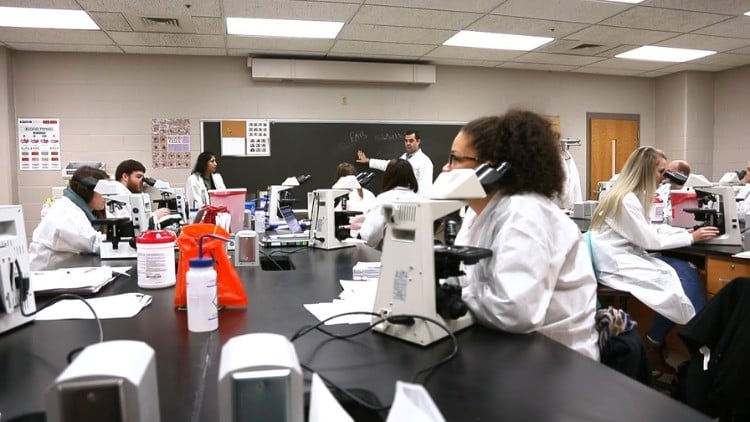
Self Learning Course
⏱️ Length: 4.6 total hours
⭐ 4.31/5 rating
👥 5,971 students
🔄 March 2023 update
Add-On Information:
Note➛ Make sure your 𝐔𝐝𝐞𝐦𝐲 cart has only this course you're going to enroll it now, Remove all other courses from the 𝐔𝐝𝐞𝐦𝐲 cart before Enrolling!
- Course Overview
- Understand the foundational role of Medical Lab Technicians in modern healthcare diagnostics.
- Explore the various departments within a clinical laboratory: hematology, chemistry, microbiology, and more.
- Grasp the significance of strict laboratory safety protocols and quality control measures.
- Learn about the ethical considerations for handling sensitive patient data and biological specimens.
- Discover how laboratory results directly impact patient diagnosis and treatment decisions.
- Gain insight into the daily operational flow and critical functions of a busy medical laboratory.
- Recognize the paramount importance of precision and accuracy in all laboratory procedures.
- Overview of different specimen types, their collection methods, and diagnostic significance.
- Requirements / Prerequisites
- A basic understanding of high school level biology and chemistry is recommended for optimal learning.
- No prior professional medical laboratory experience is strictly required, welcoming beginners.
- An inherent curiosity for scientific investigation and analytical processes is beneficial.
- Access to a computer or tablet with a reliable internet connection is essential for online learning.
- Self-motivation and discipline are key for engaging effectively with self-paced online content.
- A genuine desire to contribute to patient care through diagnostic insights is encouraged.
- Fundamental literacy skills are necessary for understanding technical documentation and reports.
- Ability to manage time effectively to complete modules and grasp concepts at your own pace.
- Skills Covered / Tools Used
- Specimen Handling: Master the proper receiving, labeling, and processing of blood, urine, and other biological samples to ensure their integrity.
- Quality Control Principles: Learn about implementing and interpreting daily quality control data for reliable and valid test results.
- Laboratory Safety Protocols: Adherence to biosafety levels, hazardous materials handling, and proper use of personal protective equipment (PPE).
- Microscopy Basics: Fundamental techniques for operating, maintaining, and interpreting results from light microscopes for cellular analysis.
- Basic Phlebotomy Principles: Introduction to safe venipuncture techniques, patient identification, and proper tube collection order.
- Instrumentation Familiarity: Understanding the basic function of common lab equipment like centrifuges, incubators, and automated analyzers.
- Accurate Data Documentation: Skills for precise and clear recording and reporting of laboratory test results.
- Critical Value Recognition: Identifying and understanding how to act upon results that require immediate clinical attention.
- Sterilization Techniques: Principles of maintaining a sterile environment within the lab to prevent contamination of samples.
- Waste Management: Safe and compliant disposal procedures for biohazardous and chemical waste materials.
- Reagent Preparation & Storage: Basic understanding of preparing and properly storing common laboratory reagents.
- Test Methodologies Overview: Explore the fundamental principles behind common hematology, chemistry, and microbiology tests.
- Basic Troubleshooting: Initial steps in identifying and resolving common operational issues with lab equipment.
- LIS (Lab Information System) Concepts: Introduction to managing and accessing lab data digitally through information systems.
- Ethical Conduct: Professional behavior, patient privacy, and maintaining strict confidentiality in lab practices.
- Benefits / Outcomes
- Develop a strong foundational understanding for an entry-level Medical Lab Technician career path.
- Gain confidence in understanding core laboratory procedures, scientific terminology, and diagnostic workflows.
- Prepare effectively for further specialized education or official certification examinations in the field.
- Acquire essential knowledge for accurately interpreting basic diagnostic reports and their clinical relevance.
- Understand the significant and direct impact of meticulous laboratory work on positive patient outcomes.
- Open pathways to diverse roles within various healthcare settings, research laboratories, or public health.
- Enhance your resume with critical insights and a structured understanding of medical laboratory operations.
- Formulate an informed decision about pursuing a full-time, dedicated Medical Lab Technician career path.
- Contribute directly to the essential function of diagnostic medicine, a cornerstone of modern healthcare.
- PROS of This Course
- Unmatched Flexibility: Learn entirely at your own pace and schedule, fitting education into any lifestyle without rigid deadlines.
- High Credibility: A strong 4.31/5 rating from nearly 6,000 students indicates proven effectiveness and high learner satisfaction.
- Up-to-Date Content: The March 2023 update ensures you’re learning the most current practices, technologies, and industry standards.
- Rapid Knowledge Acquisition: Achieve a foundational understanding efficiently and quickly within just 4.6 total hours.
- Cost-Effective Entry: An affordable introduction to a complex and vital field, minimizing initial financial investment.
- Career Exploration: An ideal way to gauge personal interest and aptitude for an MLT career path before extensive commitment.
- Solid Foundation: Builds a crucial conceptual base for future advanced studies, certifications, or hands-on clinical training.
- Accessible Learning: Designed for self-learners with no mandatory prior lab experience, making it highly inclusive.
- Convenient Format: Access course materials anytime, anywhere with an internet connection, promoting continuous learning.
- CONS of This Course
- Absence of Hands-on Practical Experience: Due to its online, self-paced, and short duration format (4.6 hours), this course fundamentally lacks the vital direct practical experience with real laboratory equipment and biological specimens essential for comprehensive skill mastery in a clinical setting.
Learning Tracks: English,Teaching & Academics,Other Teaching & Academics
Found It Free? Share It Fast!